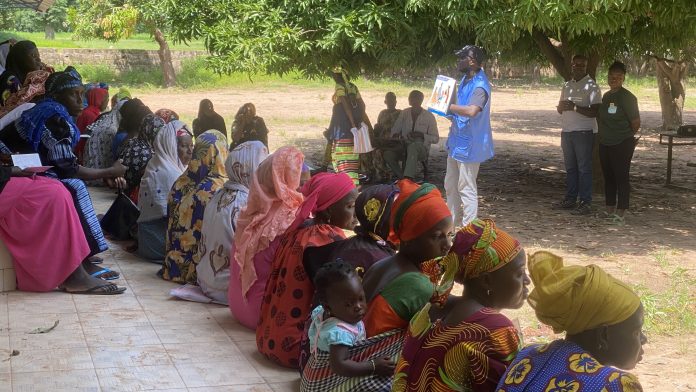By Ndey Sowe
The Senior Nutrition Field Officer of the National Nutrition Agency (NaNA) in the Upper River Region (URR), Yusupha Jawo, has called on Inter-Personal Communication (IPC) networks across the country to remain committed in their role of driving positive behavioral change within communities under the Social and Behavioral Change Communication (SBCC) component of the RISE project.
Mr. Jawo made the remarks on Wednesday, September 17, 2025, during an interview at a Nafa Cash Transfer pay point in Darsilameh, Sandu District, URR. The payments, which run from September 15 to 19, cover the West Coast, North Bank, Lower River, Central River North and South, and Upper River regions.
According to him, the IPC networks—commonly known as Village Support Groups (VSGs), are a vibrant structure within NaNA’s framework, tasked with disseminating SBCC messages that form the backbone of the Nafa Program’s community-level engagement. “The IPCs are trained on SBCC models so that they can continue communication at the community level and sustain change in behaviors,” Jawo explained.
He added that NaNA has also introduced a new initiative in phasing-out districts, focusing on positive playful parenting. “We encourage parents to positively play with their children to support their psychological and physical development, while also helping early grade students build their educational skills,” he said.
The broader Nafa Program—part of the Gambia Resilience, Inclusive, and Equitable Social Protection Project (RISE)—is jointly funded by the World Bank and the Government of The Gambia. It targets the country’s 20 poorest districts, reaching nearly 17,000 extremely poor households with bi-monthly cash transfers alongside SBCC activities.
In Kudang, Niamina East, Central River Region South, Sulayman Jallow, Senior Welfare Officer at the Department of Social Welfare, echoed the importance of the program, saying it complements the Directorate’s mandate to support vulnerable groups such as women, widows, orphans, persons with disabilities, the elderly, and people with chronic illnesses.
“This project has really helped us in terms of poverty alleviation and grievance handling,” Jallow said, while urging beneficiaries to take the SBCC lessons seriously. “The money will come and go, but the skills and knowledge from SBCC are what will sustain households after the project ends.”
Mr. Jallow noted that the project is currently in its 16th cycle, with only two cycles left. He shared some success stories of households who have invested their cash transfers into income-generating activities. “We’ve seen beneficiaries engage in rearing animals or poultry to sustain themselves. The project may not solve everything, but the knowledge and skills they acquire will help them continue to survive long after it phases out,” he remarked.


















